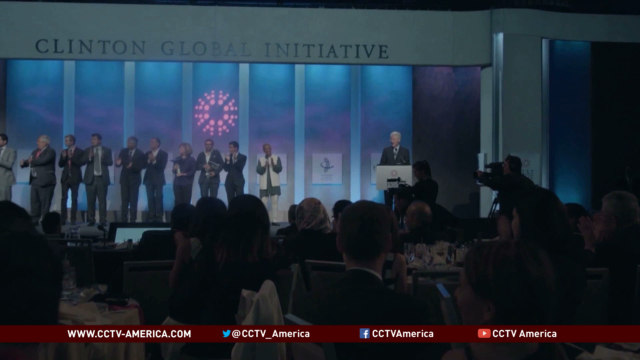It’s no secret that tech startups have become one of today’s most lucrative business ventures. Another industry that’s gaining momentum is social entrepreneurship, creating companies that aim to solve some of the world’s toughest challenges. CCTV Ameirca’s Shraysi Tandon reported on one program aimed at students.

Create a business to tackle a global issue and win $1 million — that’s the promise of Hult Prize.
It’s the world’s largest startup program directed at university students across the world. Every year, thousands of students from the U.S., India, U.K. and China compete at starting a business aiming at solving a global issue.
The finalists pitch their business idea at the annual Clinton Meetings in New York, where the winning team from one university walks away with $1 million in seed money.
“The opportunity for a startup, irrespective of sector, in my opinion is the social development space where you’ve got this massive market, which by 2020 will represent nearly $1.5 trillion of annual spent,” said Ahmad Ashkar, the CEO of Hult Prize Foundation.
“Actually, bringing innovative products and services to the world’s poorest allows the world’s poorest to get themselves out of poverty. So it’s a win-win for the world.”
Last year, students had to devise a business plan targeted at solving the global food crisis. This year, the challenge was solving non-communicable disease. The challenge for 2015 is early childhood education in the urban slum.
Experts said a growing number of youth is interested in creating social impact businesses.
“I’ve seen a really substantial impact not just in the U.S., but also in India of interests in social impact entrepreneurship. I think that comes from realization from a new generation from the people in India that the country’s problems won’t be solved by government, and they are going to have to be solved by free enterprise,” said Arun Sundarajan, a professor from New York University’s Stern School of Business.
Critics of social impact businesses said it’s not moral to extract profits from the poor. But experts in the field refuted it saying both profit and competition are necessary for success.
“My argument back to anybody challenging us, saying you can’t extract profits from their market segment, is to question whether or not we want real and tangible products brought to this segment. If we want real products, then we need competition. Competition is required. It drives down costs, and it can only exist when profits are a motive,” said Ashkar.
 CGTN America
CGTN America

